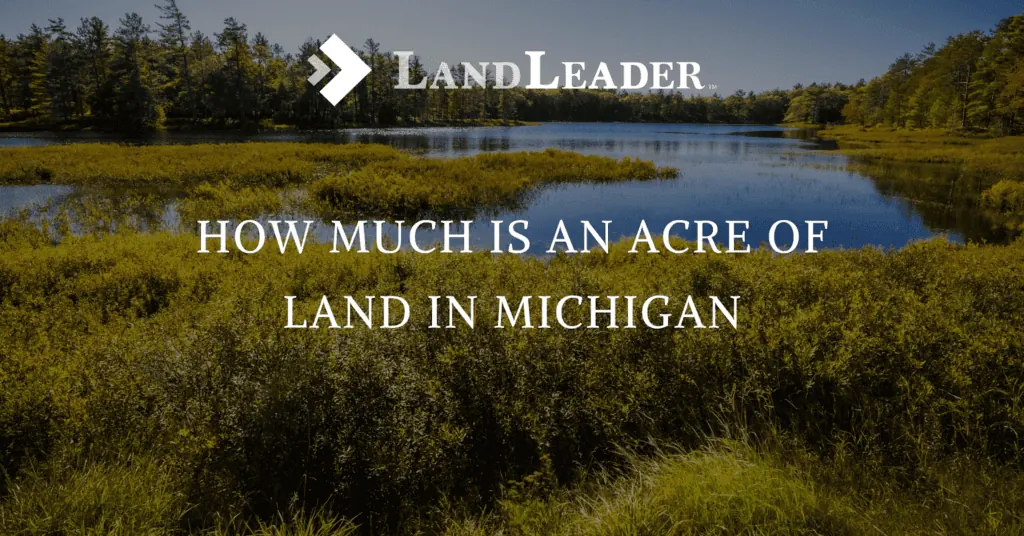
With over $100 million in active land listings, LandLeader is the premier resource for all things rural real estate in the state of Michigan. As the largest network of land brokers in the United States, we provide access to some of the nation’s top rural real estate professionals and the most recent market statistics. In this article, we break down how much an acre of land costs in Michigan, what influences that cost, and how you can buy or sell property in the Great Lakes State.
About Michigan
Michigan is one of the most geographically diverse states in the U.S., known for its abundant freshwater shoreline, dense forests, rolling hills, and vibrant agricultural economy. It is divided into two peninsulas: the Upper Peninsula and the Lower Peninsula. Michigan is bordered by four of the five Great Lakes and shares water boundaries with Canada, making it unique both geographically and economically.
The state’s natural beauty, strong economy, and ample land resources make it an attractive destination for buyers looking for recreational property, farmland, or homesteading opportunities. Whether you’re interested in a lakeside cabin or a rural retreat, Michigan offers a wide range of land types and values to suit every buyer’s need.
Michigan’s Real Estate Landscape
When evaluating the cost of land, it’s essential to consider that not all land is created equal. Factors like location, zoning regulations, soil quality, and proximity to amenities all play significant roles in determining price.
- Urban vs. Rural: Land near cities like Grand Rapids, Lansing, or Ann Arbor can be significantly more expensive due to demand and development potential. Conversely, rural areas in the Upper Peninsula or the northern Lower Peninsula often have lower prices per acre but may lack infrastructure.
- Waterfront Access: Land near lakes, rivers, or with lake frontage tends to carry a premium. Michigan, with its extensive network of inland lakes and Great Lakes shoreline, sees higher pricing in waterfront zones.
- Agricultural Use: Cropland and pastureland have a distinct pricing structure. Agricultural properties tend to be evaluated on soil quality, irrigation potential, and historical use.
How Much Is An Acre Of Land Worth in Michigan?
According to the USDA’s National Agricultural Statistics Service, the average cost of farmland in Michigan — including land and buildings — was approximately $5,300 per acre in 2021. This represented a 7% increase from the previous year. These figures are derived from agricultural real estate values, including cropland and pastureland.
However, it’s important to note that this figure represents an average across the state. In practice, land prices in Michigan can range from $1,000 per acre in remote areas of the Upper Peninsula to over $20,000 per acre near popular recreational areas or expanding suburban neighborhoods.
Examples of Per-Acre Land Values by Region:
| Region | Average Per Acre Price | Land Type |
|---|---|---|
| Northern Lower Peninsula | $2,000 – $4,500 | Forested, Recreational |
| Upper Peninsula | $1,000 – $2,500 | Timber, Hunting, Remote |
| Western Michigan | $5,000 – $8,000 | Farmland, Near Lakes |
| Metro Detroit Area | $10,000 – $20,000+ | Residential/Commercial |
| Lakeshore Properties | $15,000 – $40,000+ | Premium Waterfront |
Factors That Influence Land Prices in Michigan
Several key factors influence the price of land in Michigan:
1. Location
2. Land Use/Zoning
3. Topography and Soil Quality
4. Utilities and Infrastructure
5. Market Trends
How to Estimate the Value of Your Land
1. Comparable Sales (Comps)
2. Professional Appraisal
3. Online Tools and Marketplaces
4. Work With a Local Broker
Buying Land in Michigan: What You Need to Know
Step 1: Define Your Goals
Step 2: Set a Budget
Step 3: Conduct Due Diligence
- Check zoning regulations
- Inspect title and legal ownership
- Investigate any environmental concerns or easements
- Consider hiring a surveyor to confirm boundaries
Step 4: Partner With a Land Professional
Popular Uses for Land in Michigan
Many people purchasing land in Michigan have specific uses in mind. Here are some common reasons people buy property here:
- Recreational Use (Hunting, Fishing, Camping)
- Farming and Agriculture
- Timber and Forestry Investments
- Building a Cabin or Homestead
- Off-Grid Living
- Residential Development
- Wildlife Preservation
Why Work With LandLeader?
LandLeader is the #1 network for land marketing in the country, and we specialize in rural properties including farms, hunting land, timberland, and waterfront properties. Our Michigan-based brokers have insider access to off-market listings, deep local knowledge, and decades of combined experience.
With over $100 million in active listings, we help buyers and sellers connect in ways that go beyond traditional real estate platforms. Whether you’re a first-time buyer or a seasoned investor, LandLeader provides the tools and team you need for a successful land transaction.
Start Your Land Search Today
Browse our current Michigan land listings to get started. You can filter by price, acreage, property type, and region to find exactly what you’re looking for. Once you find a listing you’re interested in, you can contact the broker directly or reach out to us for help connecting with a LandLeader partner in your area.
Have questions? Contact us today to speak with a Michigan land specialist.